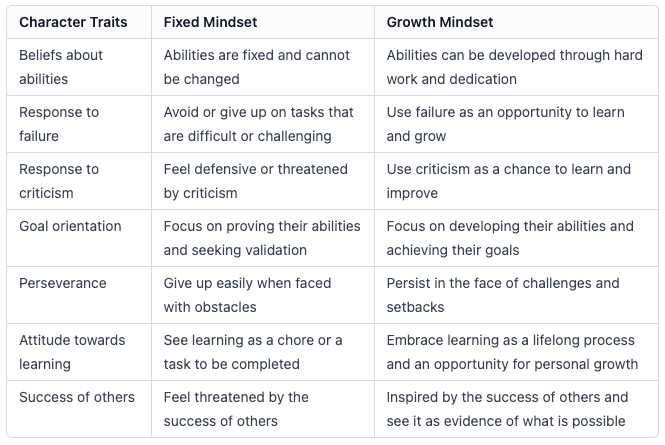Self-limiting beliefs and how to overcome them
Fixed mindset
Dr. Carol Dweck noticed a significant difference between students’ approaches to success and failure and its impact on their achievements. It inspired her to start doing research and build a theory around it.
“My work bridges developmental psychology, social psychology, and personality psychology, and examines the self-conceptions (or mindsets) people use to structure the self and guide their behavior. My research looks at the origins of these mindsets, their role in motivation and self-regulation, and their impact on achievement and interpersonal processes.”, Dr. Carol Dweck.
In her book ‘Mindset: The New Psychology of Success‘ she distinguishes between fixed and growth mindsets:
supporting research: (Yeager, Dweck, 2012)
Key conclusions
Everyone can improve and grow through effort and perseverance.
Mindset is not binary, it sits on a spectrum between growth and fixed mindsets. This approach allows a more nuanced understanding of how people view themselves and their abilities. It also highlights the fact that a variety of factors, including past experiences, cultural background, and environment can influence mindset.
Key suggestions
Emphase the power of effort and perseverance. See challenges as opportunities for growth.
Do not praise innate ability or talent, praise effort, progress, and the strategies to overcome challenges.
Accept that mistakes are a natural part of the learning process and use them as opportunities for reflection and growth.
Develop strategies for coping with setbacks (emotions play a big part here). Reframe negative self-talk and seek support from peers, friends, and mentors (who have a growth mindset).
Upper Limit Problem
Dr. Gay Hendricks working with his clients as a therapist noticed that many would make progress toward their goals but then self-sabotage when they were on the verge of achieving success.
"People would start to make progress and then suddenly something would happen to throw them off track. It was as if they had an invisible upper limit on how much success or happiness they could allow themselves to experience. As I delved deeper into this phenomenon, I began to realize that we all have an inner thermostat that determines our level of success and happiness. And when we approach or exceed that limit, we tend to self-sabotage or create problems for ourselves to bring us back down to our comfort zone.", Dr. Gay Hendricks.
Dr. Hendricks defines the ‘upper limit problem’ as a self-imposed limit that we place on our own happiness, success, and abundance.
Key suggestions
You need to remember that thoughts, feelings, and behaviors are connected. And teach yourself to recognize triggers that might manifest as self-limiting behavior.
Top limiting behaviors
Unnecessary worry
It is worrying about something we have no control over. Worrying is useful only if we can actually do something about an issue and if it leads to taking positive action right away. Ask yourself 2 questions: “Is my concern a real possibility?” and “Is there any action I can take right now to make a positive difference?“.
If you have a real concern that can be addressed take action. This can help to reduce your anxiety and give you a sense of control over the situation.
If your worry is not real or cannot be addressed try to practice mindfulness:
Breathing exercises: focus on your breathing, taking slow, deep breaths in through your nose and out through your mouth. Notice the sensation of your breath as it moves in and out of your body, without trying to change it.
Awareness of surroundings: use your senses to become more aware of your surroundings. Notice the sounds, smells, and sensations around you. Be present and fully engaged in your experience.
Being at present moment: bring your attention back to the present moment whenever you notice your thoughts drifting. Do not judge yourself or your thoughts, simply observe them and then bring your focus back to your breath or your surroundings.
Meditation: meditation is a practice that involves training your mind to focus on a particular object, thought or activity in order to achieve a state of calm and clarity. There are many books, workshops, and YouTube videos that explain it well.
Criticism and blame
Criticism and blame are often used as coping mechanisms to avoid taking responsibility for our own actions and feelings.
Embrace a mindset of personal accountability, which involves acknowledging and owning your shortcomings and take actions to overcome them.
Deflection
Deflection is avoiding uncomfortable emotions or situations by distracting ourselves with other activities or thoughts. It can manifest in various ways, such as procrastination, addiction, or self-sabotage.
To overcome deflection cultivate self-awareness of emotions, thoughts, and behaviors. Pay attention to the situations that trigger deflection and try to identify the underlying fears (uncomfortable emotions). By acknowledging and addressing underlying fears we can start to break free of deflection.
Zone of Genius
Dr. Hendricks uses the idea of 4 zones:
Zone of Incompetence: activities that we are not skilled at or do not enjoy doing. When we operate in this zone, we may feel frustrated, stressed, or overwhelmed.
Zone of Competence: activities that we are capable of doing, but may not excel at. When we operate in this zone, we may feel comfortable, but not particularly fulfilled or energized.
Zone of Excellence: activities that we have developed high proficiency in through hard work and dedication. When we operate in this zone, we may feel successful and recognized, but may not experience the same level of fulfillment and satisfaction as in the Zone of Genius.
Zone of Genius: activities that we are uniquely talented at and passionate about. When we operate in this zone, we experience a deep sense of fulfillment, energy, and inspiration.
To discover your Zone of Genius identify the unique abilities and talents that you possess and pay attention to activities that make you feel deeply fulfilled and energized. Once you have identified your Zone of Genius focus on maximizing your time spent in this area, and delegating or outsourcing tasks that fall outside of your Zone of Genius to others who may excel in those areas.



